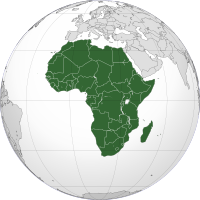
Photo from wikipedia
Extended-care interventions have been demonstrated to improve maintenance of weight loss after the end of initial obesity treatment; however, it is unclear whether these programs are similarly effective for African… Click to show full abstract
Extended-care interventions have been demonstrated to improve maintenance of weight loss after the end of initial obesity treatment; however, it is unclear whether these programs are similarly effective for African American versus White participants. The current study examined differences in effectiveness of individual versus group telephone-based extended-care on weight regain, compared to educational control, in 410 African American (n = 82) and White (n = 328) adults with obesity (mean ± SD age = 55.6 ± 10.3 years, BMI = 36.4 ± 3.7 kg/m2). After controlling for initial weight loss, multivariate linear models demonstrated a significant interaction between treatment condition and race, p = .048. Randomization to the individual telephone condition produced the least amount of weight regain in White participants, while the group condition produced the least amount of weight regain in African American participants. Future research should investigate the role of social support in regain for African American versus White participants and examine whether tailoring delivery format by race may improve long-term outcomes.
Journal Title: Journal of Behavioral Medicine
Year Published: 2022
Link to full text (if available)
Share on Social Media: Sign Up to like & get
recommendations!